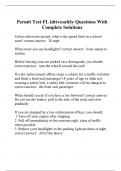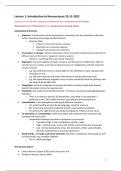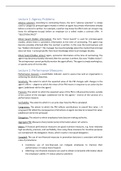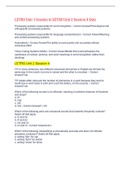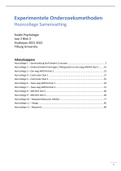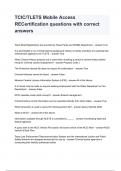, Theory and Methods – Perspectives
Functionalism Hand out 1
Functionalism is a modernist consensus theory rooted in the work of Durkheim and refined by Parsons and Merton. It was a very popular approach in the
1950s and 1960s, but is now generally regarded as an inadequate and old fashioned approach to understanding society. Functionalism regards society as a
stable, harmonious integrated social system, with social order and cohesion maintained by a fundamental value consensus.
Society remains harmonious through two key elements which promote consensus:
Socialisation: the values of society are transmitted from one generation to the next and internalised to form an integral part of individual
personalities.
Social Control: the various mechanisms of social control (sanctions) discourage deviance, and so maintain order in the system.
Society as an Organic Analogy Functional Prerequisites
Parsons believes that society requires the instrumental and expressive role to
• Society operates like a human body be performed in order to meet functional prerequisites. These are the needs
of the social system.
• Both systems contain parts that are
separate but interdependent and In order for each society to survive it must
interconnected
Adaptation meet its members material needs e.g. Banks
Economic
• Society & the body have needs
• In order to meet the needs, individual Must develop ways of making decisions and
Goal
institutions provide functions attainment moving towards set goals e.g. political
Political system
For example, Education relies on the Family
performing primary socialisation properly.
Limiting conflict in society e.g. the Law
Integration
Similarly, religion in a modern world is relying on
Social harmony
media to counter secularisation. Finally, education
relies on government for funding Maintaining values in society, usually taught
• Commitment to religion/family/work prevent crime
Latency through socialisation e.g. family, education,
Pattern
Maintenance religion — links to tension maintenance i.e.
Warm Bath
Individuals are governed by multiple sub-systems (institutions) in society i.e. a teacher is mainly influenced
by education but also influenced by media, government, religion etc.
, Theory and Methods – Perspectives
Social change and social evolution
Functionalists regard social change as occurring when new functions emerge or society need to adapt. They regard change as a slow process of social
evolution, as gradual shifts occur in social values and people adapt to changes and reaffirm their commitment to them. As all the parts of society link together,
a change in one part will result in changes elsewhere, but the system will remain balanced and stable. Society will always be in equilibrium
Role of the family (nuclear) Modern society
Foster care (state) and secondary socialisation by other instutions
Latency The family was the main agency of socialisation
Adaptation Family would provide economic stability Welfare
Adaptation Family would provide reproduction Healthcare (IVF)
EVALUATION Merton’s criticism of Functionalism
Functionalism has been criticised from within its theory by Robert K Merton. He argues that all functions in society do not always perform positive functions
that are beneficial to society. In a society that is so complex, it is inevitable for something to go wrong. Therefore, society can be dysfunctional as some
institutions are not always beneficial when performed and can be harmful for the environment.
Institution Negative consequences
Ignore dark side of the family (DV), nuclear family oppresses women
Family
Patriarchy against women, ISA, Opium of the People, Power of the Ruling
Religion
Class, fundamentalism
Cultural capital, institutional racism, anti school subcultures ethnocentric
Education
curriculum, hidden curriculum
Merton also believes that traditional functionalist ideas can be criticised in the following ways:
Indispensability:
Functionalism is wrong to assume institutions are functionally successful i.e. wrong to assume family is the best in
performing primary socialisation
Functional Unity:
There are some aspects of society that are not interdependent. E.g. how can we apply the rules of sport to the
structure of banking
, Theory and Methods – Perspectives
Exam style questions
10 mark questions for theory and methods will not have an item!
1) Outline and explain two functionalist concepts [10 marks]
Item A
Functionalism is a consensus theory. It sees society as based on a set of shared values and this value
consensus is the basis for social order. It is also a systems theory. It emphasises the ways the social
system shapes social institutions and the behaviour patterns of individuals. Society is seen as a system
with its own separate existence and needs.
However, some critics claim that functionalism understates the extent of conflict in society. Others argue
that functionalism is too deterministic, portraying individuals as simply the puppets of the social system.
2) Applying material from Item A and your knowledge, evaluate the claim that functionalism
understates both the extent of conflict in society and the ability of social actors to create society
through interaction. [20 marks]
Introduction Outline key functionalist ideas/concepts/theorists
P1 – Parsons Explain – AGIL system
functional pre-
requisites Evidence/Example these
‘Society is seen as a
system with its own Link/Develop- Here you could apply knowledge of this from your study of
separate existence Fam/Ed/Crime/Beliefs
and needs.’
Evaluate
P2 – Value Explain – Key ideas
consensus and
social order Evidence/Example these
‘It sees society as
based on a set of Link/Develop- Here you could apply knowledge of this from your study of
shared values and Fam/Ed/Crime/Beliefs
this value
consensus is the Evaluate
basis for social
order’
P3 – Positive Explain –
functions of
institutions Evidence/Example these
‘Functionalism is a
consensus theory.’ Link/Develop- Here you could apply knowledge of this from your study of
Fam/Ed/Crime/Beliefs
Evaluate
Conclusion No new ideas should be explored here!
Is Functionalism still relevant today?



